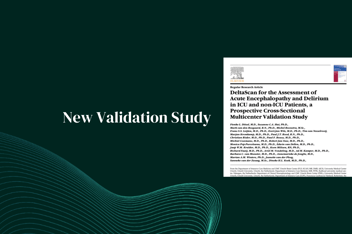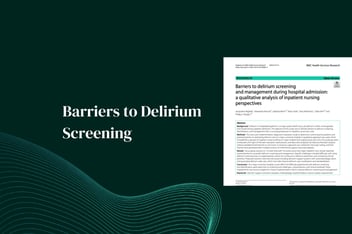The Delphi Delirium Management Algorithms. A practical tool for clinicians.

A big step forward for the treatment of acute encephalopathy and delirium. A team of 37 delirium experts from around the world created an algorithm that provides a structured approach to managing the underlying causes of delirium in hospitalized patients.
The Delphi Delirium Management Algorithms. A practical tool for clinicians, the result of a modified Delphi expert consensus approach.
Thomas H. Ottens, Carsten Hermes, Valerie Page, Mark Oldham, Rakesh Arora, O. Joseph Bienvenu III, Mark van den Boogaard, Gideon Caplan, John W. Devlin, Michaela-Elena Friedrich, Willem A. van Gool, James Hanison, Hans-Christian Hansen, Sharon K. Inouye, Barbara Kamholz, Katarzyna Kotfis, Matthew B. Maas, Alasdair M.J. MacLullich, Edward R. Marcantonio, Alessandro Morandi, Barbara C. van Munster, Ursula Müller-Werdan, Alessandra Negro, Karin J. Neufeld, Peter Nydahl, Esther S. Oh, Pratik Pandharipande, Finn M. Radtke, Sylvie De Raedt, Lisa J. Rosenthal, Robert Sanders, Claudia D. Spies, Emma R.L.C. Vardy, Eelco F. Wijdicks, Arjen J.C. Slooter
Keywords: Delirium, Clinical practice algorithm, Expert consensus, Intensive Care, Cardiac surgery, Hospital medicine
DOI: https://doi.org/10.56392/001c.90652
Abstract
Delirium is common in hospitalised patients, and there is currently no specific treatment. Identifying and treating underlying somatic causes of delirium is the first priority once delirium is diagnosed. Several international guidelines provide clinicians with an evidence-based approach to screening, diagnosis and symptomatic treatment. However, current guidelines do not offer a structured approach to identification of underlying causes.
A panel of 37 internationally recognised delirium experts from diverse medical backgrounds worked together in a modified Delphi approach via an online platform. Consensus was reached after five voting rounds. The final product of this project is a set of three delirium management algorithms (the Delirium Delphi Algorithms), one for ward patients, one for patients after cardiac surgery and one for patients in the intensive care unit.
Introduction
"Delirium is an acute disorder of brain function that is caused by other medical conditions, substance intoxication or withdrawal, or exposure to a toxin. It is characterized by a disturbance in attention, a reduced level of orientation to the environment and other cognitive disturbances that cannot otherwise be explained by neurocognitive disorders. Delirium can be regarded as a clinical expression of acute encephalopathy. Delirium frequently occurs in hospitalized adults, and is associated with significantly increased ICU and hospital length of stay, mortality, as well as an increased risk of long-term cognitive disorders and loss of independence. The economic impact of delirium is substantial. Delirium in older hospitalized adults has been estimated to cost between $38 billion and $152 billion per year."
Full article
Full article can be found here: https://deliriumjournal.com/article/90652-the-delphi-delirium-management-algorithms-a-practical-tool-for-clinicians-the-result-of-a-modified-delphi-expert-consensus-approach




